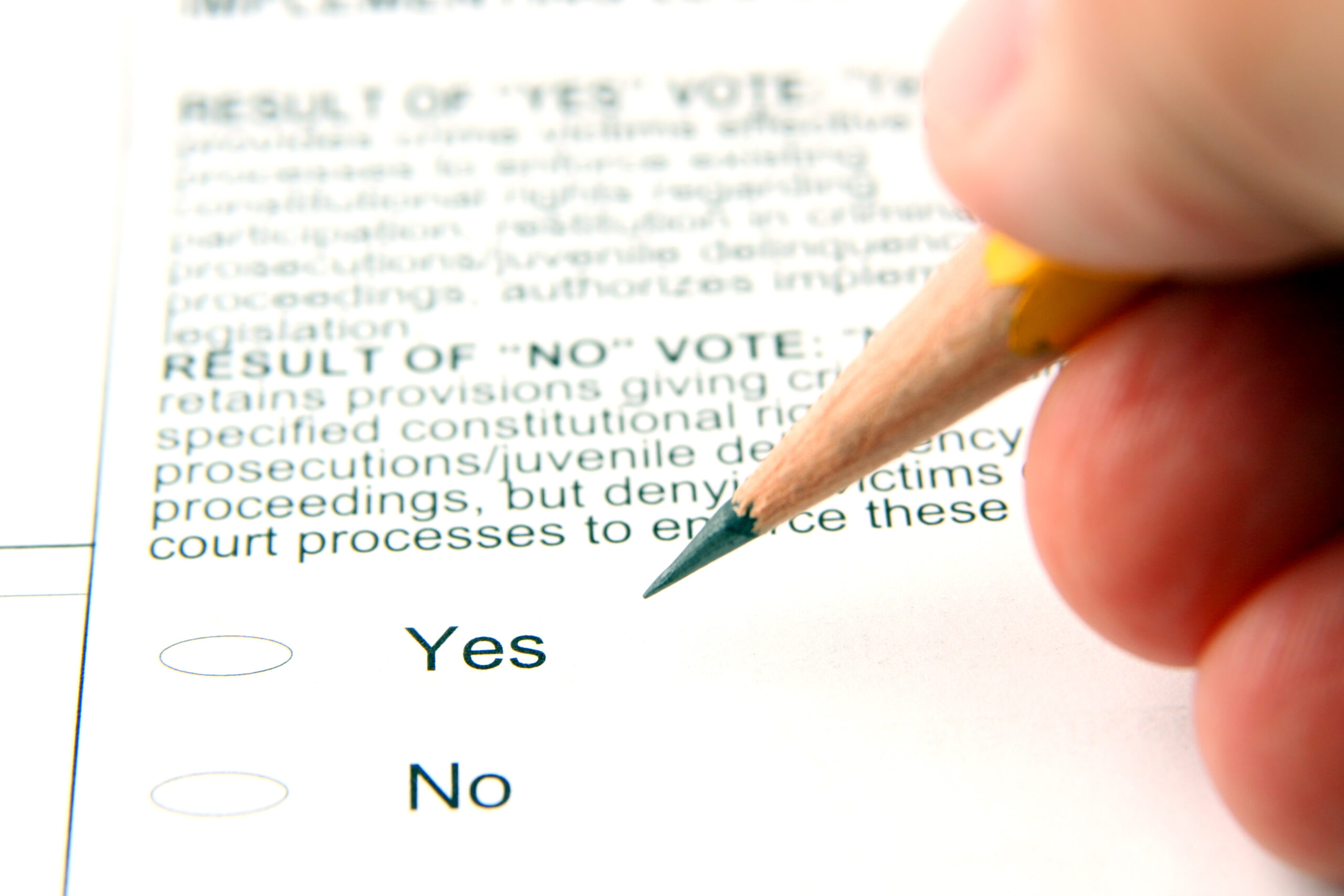What questions will appear on 2020 ballots?
Across the United States, ballot measures exist in the form of a law, issue, or question that appears on a state or local ballot for voters to decide. There are numerous kinds of ballot measures, including those that are legislatively referred or citizen-initiated.
In 2016, the last presidential election, there were 162 statewide ballot measures, including 76 initiatives, 71 legislative referrals, and 15 by other means. What measures are on states’ ballots in the upcoming 2020 elections?
New Jersey
Garden State voters will have three 2020 ballot measures. Public Question No. 1 involves legalizing recreational marijuana for those over the age of 21. The Legislature has failed to pass previous efforts to legalize recreational marijuana. If voters approve, the Cannabis Regulatory Commission (created in 2019) would oversee the new adult cannabis market, and all retail sales of cannabis products would be subject to the state’s sales tax. A municipality could also pass a local ordinance to charge a local tax if authorized by lawmakers.
A July poll showed about 68% of New Jersey voters strongly support or somewhat support legalization via the ballot measure. This is higher than an April Monmouth University poll, which found 61% of respondents support the measure. With fewer than two months before Election Day, a coalition of activists and experts are rolling out a campaign supporting Public Question No. 1. NJ CAN 2020, which formed in March, includes members of the ACLU of New Jersey, Doctors for Cannabis Regulation, the Latino Action Network, the American Trade Association for Cannabis and Hemp, Law Enforcement Action Partnership, the NAACP New Jersey State Conference, and the NJ CannaBusiness Association.
Public Question No. 2 asks voters whether they approve amending the state constitution to give a $250 property tax deduction to veterans who did not serve in wartime and whether they approve amending the Constitution to give a 100% property tax exemption to certain totally disabled veterans who did not serve in wartime. Widows or widowers of these veterans would receive the deduction or exemption after the death of the veteran if approved, as well. Under current New Jersey law, the state only provides these property tax deductions and exemptions to veterans who served during wartime, not peacetime.
Public Question No. 3 asks voters if they approve amending the state constitution to alter the timing of redistricting if federal census data is delayed. With COVID-19 and the Trump administration delaying census data collection, this measure would allow legislators to be elected in the next election from their existing districts for their two-year term in office with the new districts starting to be used in the next scheduled state legislature general elections.
Arkansas
Arkansas voters face four ballot measures for the 2020 General Election. Included is Issue No. 2, the “Arkansas Term Limits Amendment,” a constitutional amendment that provides:
- A person who has served 16 or more years in the General Assembly shall not be eligible for subsequent service in the General Assembly until four years after the expiration of the last term of office in the General Assembly for which he or she was elected;
- A person first elected as a member of the General Assembly on or after January 1, 2021, shall serve no more than 12 consecutive years;
- A member of the General Assembly first elected on or after January 1, 2021, who serves 12 or more consecutive years shall not be eligible for subsequent service until four years after the expiration of the last term of office in the General Assembly for which he or she was elected;
- A member first elected to the General Assembly on or after January 1, 2021, who completes his or her twelfth consecutive year of service during a term of office for which he or she has been elected may serve until the completion of that term of office;
- Consecutive years of service in both the Senate and the House of Representatives shall be added together and included to determine the total number of consecutive years in office of a member first elected to the General Assembly on or after January 1, 2021;
- A two-year term served as a result of apportionment of the Senate shall be included in calculating the total number of consecutive years served by a member of the General Assembly first elected to the General Assembly on or after January 1, 2021; and
- A partial legislative term served as a result of a special election under Article 5, § 6, shall not be included in calculating the total number of consecutive years served by a member of the General Assembly first elected to the General Assembly on or after January 1, 2021.
In late August, the Arkansas Supreme Court removed two ballot measures from the November 3 election. One measure, a constitutional amendment proposed by Arkansas Voters First, would have put both redistricting duties in the hands of a new commission comprised of Republicans and Democrats in time for a new redistricting round in 2021. The other proposal involved the issue of ranked-choice voting. It would have changed the state’s primary elections to a system in which partisan candidates compete against one another in the same primary, and then the top four advance to the general election. Further, general elections would permit voters to rank candidates in order of their preference, rather than requiring the selection of a single candidate.
The state Supreme Court, in a 6-1 majority decision, disqualified both measures on technical grounds, finding that the groups organizing signature canvassers had “acquired” background checks, but had mistakenly not certified that the canvassers had “passed” the checks.
Colorado
Colorado has numerous ballot measures for the upcoming election. Lawmakers passed Senate Bill 19-042, now Proposition 113 on the 2020 ballot, which will ask voters whether Coloradan presidential electors will vote for the candidate who wins the national popular vote. The question on the ballot will read:
Shall the following Act of the General Assembly be approved: An Act concerning adoption of an agreement among the states to elect the President of the United States by national popular vote, being Senate Bill No. 19-042?
Specifically, the measure joins Colorado into an interstate pact to elect the U.S. President by national popular vote instead of the current state electoral system, which requires Coloradan electors to vote for the presidential candidate winning the state popular vote.
Registered issue committees supporting Proposition 113 include Coloradans for National Popular Vote, Yes on National Popular Vote, and Conservatives for Yes on National Popular Vote. In opposition is Protect Colorado’s Vote.
Another ballot measure involves the prohibition of late-term abortions. Currently, Colorado state law permits abortions at any time during pregnancy. The initiative would ban abortions after 22 weeks of fetal gestational age. The question itself reads:
Shall there be a change to the Colorado Revised Statutes concerning prohibiting an abortion when the probable gestational age of the fetus is at least twenty-two weeks, and, in connection therewith, making it a misdemeanor punishable by a fine to perform or attempt to perform a prohibited abortion, except when the abortion is immediately required to save the life of the pregnant woman when her life is physically threatened, but not solely by a psychological or emotional condition; defining terms related to the measure including “probable gestational age” and “abortion,” and excepting from the definition of “abortion” medical procedures relating to miscarriage or ectopic pregnancy; specifying that a woman on whom an abortion is performed may not be charged with a crime in relation to a prohibited abortion; and requiring the Colorado medical board to suspend for at least three years the license of a licensee whom the board finds performed or attempted to perform a prohibited abortion?
Registered issue committees in favor of Proposition 115, Initiative #120, include the Coalition for Women and Children, the Alliance for Life, and End Birthday Abortions Colorado. Committees opposed include Abortion Access for All and Students Vote No on 115.
Florida
Florida voters will see numerous ballot measures in 2020. One ballot measure, “All Voters Vote in Primary Elections for State Legislature, Governor, and Cabinet,” allows all registered voters to vote in primaries regardless of political party affiliation. All candidates for an office, including party-nominated candidates, would appear on the same primary ballot. The two highest vote-getters would advance to the general election. If only two candidates were to qualify, the state would not hold a primary election, and a general election would determine a winner. If approved, the amendment would be effective on January 1, 2024.
Another ballot measure, “Raising Florida’s Minimum Wage,” would raise the Florida minimum wage. The measure would increase the state minimum wage to $10 an hour effective September 30, 2021, and increase the wage by $1 per hour every year until it reaches $15 an hour. After the minimum wage reaches $15 an hour, the state would adjust future increases annually for inflation. A recent poll found 67% of registered voters said they would vote to raise the minimum wage, with only 26% in opposition. Florida currently has only an $8.56 an hour minimum wage. The measure requires 60% approval.
Another measure Sunshine State voters will decide on is the “Voter Approval of Constitutional Amendments.” The measure would require voters to approve of all proposed amendments or revisions to the state constitution in not one, but two elections, to take effect.
Maryland
Two constitutional amendments will appear on 2020 Maryland ballots. The first question, originating from Senate Bill 1028, would alter Maryland’s budget process. Current Maryland law prohibits the General Assembly from increasing any budget item or adding any new appropriations item to the Governor’s budget for Executive Branch agencies. However, lawmakers may increase funding for the legislative and judicial branches. Except for expenditures required by the Maryland Constitution, lawmakers may decrease funding in the operating budget for each of the three branches, and once lawmakers approve the operating budget, it becomes law immediately without any further action by the Governor.

The amendment would allow lawmakers to increase appropriations made by the Governor and add items to appropriations for Executive Branch agencies, beginning with the FY 2024 budget. The Governor would further be allowed to use a line-item veto to reject an individual budget item. Lawmakers would be authorized to override such a veto with 3/5 vote in each chamber.
The second question, originating from Senate Bill 4, would expand commercial gaming. This referendum would authorize lawmakers to allow the State Lottery and Gaming Control Commission to issue licenses to offer betting on sports and other competitive events. The referendum further requires lawmakers to specify who is eligible to apply for a license to operate sports and event betting, what forms of betting are permitted, how betting should be conducted, and where someone can place a bet. The referendum also provides that the state must use revenues generated by such betting primarily for funding public education. Under current Maryland law, betting on sports is illegal.
Montana
Five ballot measures will appear in front of Montana voters in 2020. The measures include two constitutional amendments, a constitutional initiative, a legislative referendum, and an initiative. Montana lawmakers referred HB 357 to the 2020 General Election Ballot, and it is now Legislative Referendum 130. LR-130 restricts a county, city, town, consolidated local government, or other local government unit’s authority to regulate firearms. It removes local government units’ power to regulate concealed weapons or restrict unconcealed firearms except in publicly owned and occupied buildings under their jurisdiction. LR-130 also repeals local government units’ authority to prevent or suppress convicted felons’, adjudicated mental incompetents’, illegal aliens’, and minors’ firearm possession.
Ballot Issue #14, I-190, legalizes the possession and use of limited amounts of marijuana for adults over 21 years old. Under this initiative, the Department of Revenue would be required to license and regulate the cultivation, transportation, and sale of marijuana and marijuana-infused products and to inspect premises where marijuana is both cultivated and sold. A 20$ tax on non-medical marijuana would be imposed, with 10.5% of the tax revenue going to Montana’s General Fund and the rest dedicated to conservation programs, substance abuse treatment, veterans’ services, healthcare costs, and localities where marijuana is sold. The initiative would also allow a person currently serving a sentence for an act permitted by I-90 to apply for resentencing or an expungement of the conviction. However, the initiative would prohibit the advertising of marijuana and related products. Legalizing recreational marijuana would generate $48 million annually by 2025, with the General Fund netting $4 million.
Virginia
Virginia voters face two constitutional amendments on the 2020 ballot. Current Virginia law stipulates that lawmakers and the Governor are responsible for drawing new election districts for the U.S. House of Representatives, the commonwealth Senate, and the House of Delegates. Current Virginia law requires that districts be compact and contiguous and have equal populations. The proposed amendment would shift these responsibilities to a bipartisan commission, comprised of 16 people. Of the 16 people, half would be members of the General Assembly and the other half Virginian citizens. The commission would draw the election districts for the previously mentioned offices and submit the maps to lawmakers for approval. If lawmakers do not approve by a specific date, the commission would be allowed additional time to draw new districts. However, if lawmakers fail to submit or approve, the Supreme Court of Virginia would become responsible for drawing election districts.
The ballot question reads:
Should the Constitution of Virginia be amended to establish a redistricting commission, consisting of eight members of the General Assembly and eight citizens of the Commonwealth, that is responsible for drawing the congressional and state legislative districts that will be subsequently voted on, but not changed by, the General Assembly and enacted without the Governor’s involvement and to give the responsibility of drawing districts to the Supreme Court of Virginia if the redistricting commission fails to draw districts or the General Assembly fails to enact districts by certain deadlines?
The second proposed constitutional amendment in Virginia would add to the list of property not subject to state or local taxation one motor vehicle owned and used mainly by or for a U.S. armed forces veteran or veteran of the Virginia National Guard who has a 100% service-connected, permanent, and total disability. The motor vehicle may be an automobile or pickup truck. The question reads:
Should an automobile or pickup truck that is owned and used primarily by or for a veteran of the United States armed forces or the Virginia National Guard who has a one hundred percent service-connected, permanent, and total disability be free from state and local taxation?
Latest News
Photo credit: iStock.com/rarrarorro The 2025 Pennsylvania primary election results are in. From Pittsburgh’s tightly contested mayoral race to Harrisburg’s crowded Democratic primary and key judicial contests across the state, voters made their voices heard. Meanwhile, [...]
Photo credit: iStock.com/burcu demir The 2024 election brought a major shift in the political landscape, with Republicans making sweeping gains across the country. Former President Donald Trump returned to the White House, winning both the [...]
Photo credit: iStock.com/Svanblar In the 2024 U.S. general elections, voters nationwide will make crucial decisions on 2024 ballot measures alongside selecting their political representatives. These ballot measures allow citizens to directly vote on policy issues [...]
Ever wondered what goes into organizing a U.S. presidential debate? In this episode of Back in Session, Ryan Stevens and Ryan DeMara sit down with Jean Cantrell and Dan Felton, who have served as members of [...]






Stay In Touch